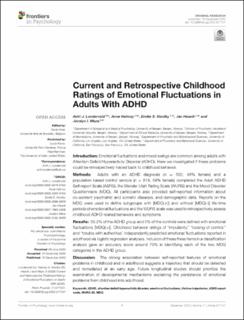| dc.contributor.author | Lundervold, Astri J. | |
| dc.contributor.author | Halmøy, Anne | |
| dc.contributor.author | Nordby, Emilie Sektnan | |
| dc.contributor.author | Haavik, Jan | |
| dc.contributor.author | Meza, Jocelyn I. | |
| dc.date.accessioned | 2021-04-20T09:29:27Z | |
| dc.date.available | 2021-04-20T09:29:27Z | |
| dc.date.created | 2021-01-16T17:48:23Z | |
| dc.date.issued | 2020 | |
| dc.Published | Frontiers in Psychology. 2020, 11 . | |
| dc.identifier.issn | 1664-1078 | |
| dc.identifier.uri | https://hdl.handle.net/11250/2738575 | |
| dc.description.abstract | Introduction: Emotional fluctuations and mood swings are common among adults with Attention Deficit/Hyperactivity Disorder (ADHD). Here we investigated if these problems could be retrospectively traced back to childhood behavior.
Methods: Adults with an ADHD diagnosis (n = 502, 48% female) and a population-based control sample (n = 818, 59% female) completed the Adult ADHD Self-report Scale (ASRS), the Wender Utah Rating Scale (WURS) and the Mood Disorder Questionnaire (MDQ). All participants also provided self-reported information about co-existent psychiatric and somatic diseases, and demographic data. Reports on the MDQ were used to define subgroups with [MDQ(+)] and without [MDQ(–)] life-time periods of emotional fluctuations and the WURS scale was used to retrospectively assess childhood ADHD related behaviors and symptoms.
Results: 50.2% of the ADHD group and 5% of the controls were defined with emotional fluctuations [MDQ(+)]. Childhood behavior ratings of “impulsivity,” “loosing of control,” and “trouble with authorities” independently predicted emotional fluctuations reported in adulthood via logistic regression analyses. Inclusion of these three items in a classification analysis gave an accuracy score around 70% in identifying each of the two MDQ categories in the ADHD group.
Discussion: The strong association between self-reported features of emotional problems in childhood and in adulthood suggests a trajectory that should be detected and remediated at an early age. Future longitudinal studies should prioritize the examination of developmental mechanisms explaining the persistence of emotional problems from childhood into adulthood. | en_US |
| dc.language.iso | eng | en_US |
| dc.publisher | Frontiers Media | en_US |
| dc.rights | Navngivelse 4.0 Internasjonal | * |
| dc.rights.uri | http://creativecommons.org/licenses/by/4.0/deed.no | * |
| dc.title | Current and Retrospective Childhood Ratings of Emotional Fluctuations in Adults With ADHD | en_US |
| dc.type | Journal article | en_US |
| dc.type | Peer reviewed | en_US |
| dc.description.version | publishedVersion | en_US |
| dc.rights.holder | Copyright 2020 Lundervold, Halmøy, Nordby, Haavik and Meza. | en_US |
| dc.source.articlenumber | 571101 | en_US |
| cristin.ispublished | true | |
| cristin.fulltext | original | |
| cristin.qualitycode | 2 | |
| dc.identifier.doi | 10.3389/fpsyg.2020.571101 | |
| dc.identifier.cristin | 1872545 | |
| dc.source.journal | Frontiers in Psychology | en_US |
| dc.source.40 | 11 | |
| dc.identifier.citation | Frontiers in Psychology. 2020, 11, 571101. | en_US |
| dc.source.volume | 11 | en_US |

